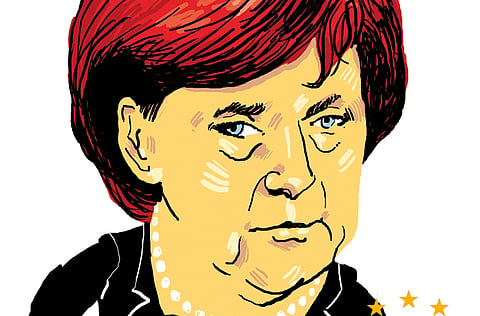Ms Europe or Frau Germania?
Merkel spoke of need to be able to exclude euro-zone members that don't comply

Just what is the matter with Angela Merkel? Only a short while ago, she was celebrated as "Ms Europe"; now, she increasingly gives the impression of being Frau Germania. Instead of providing resolute leadership in the global financial and economic crisis, the European Union's largest economy is withdrawing into its shell.
Germany has always been the motor of European integration, in accordance with its political and economic interests. Every post-Second World War government has always been willing to harness Germany's financial strength to further that aim, i.e., to foot the bill for Europe.
The motto was simple: Germany gives and profits in turn. Should Germany spurn the first part of this formula, the European project would suffer serious damage — and so will German national interests. Yet this is the direction in which Chancellor Merkel seems to be heading.
Indeed, in the wake of the Greek crisis, Merkel spoke publicly of the need to be able to exclude euro-zone members that do not play by the rules. Does she seriously believe that the euro and the EU would survive such punitive action? Instead of ideas for strengthening the solidarity and stability of the euro zone, absurd proposals are floated in Berlin.
The idea that Germany would show financial solidarity with weakened euro zone members only if they accept draconian stabilisation measures is similarly unrealistic. Such measures would only exacerbate deflation in these countries, which are the most important markets for German exports.
What is essential is the right combination of stability and financial aid, even if the latter is unpopular with the German public. To be sure, euro zone member states also needed the courage to respond to the crisis of confidence confronting the common currency with concerted action for tighter control of national budgets and improved co-operation. As a first step, however, Greece must be given help, through the financial solidarity of EU governments.
On the other hand, foreign criticism of Germany for running a current-account surplus similar to China's is unfounded. Such criticism disregards two important differences: first, unlike China, Germany, as a member of the euro zone, cannot undervalue its currency. Second, German "exports" go mainly to the EU.
To demand that Germany should stop increasing its competitiveness, or even reduce it, is simply bizarre. From 1990 to 2005, Germany struggled with high unemployment, slow growth, and low competitiveness, and Europe's economy suffered as a result. Recovery was difficult to achieve, but the Common Market has profited from Germany's renewed competitiveness.
The crucial point is not the German economy's renewed strength, but whether Germany will use this strength in Europe's interest or its own.
The responsibility for the current conflict within the EU rests with euro zone governments, but primarily with Germany and France, the zone's two strongest economies. Rather than lead, the Franco-German couple is constantly, and publicly, at each other's throats. While today's quarrel is about who should pay for restructuring Greece, the real issue is the latent distrust between the two partners, which carries the danger of a permanent estrangement.
Suspicion
From the German point of view, France only wants to solve its national budget and debt problems at Germany's expense, simultaneously weakening Germany's competitiveness. The French government, on the other hand, fears that the Germans' commitment to euro zone stability is a ploy aimed at pushing France into a corner and leaving it behind economically.
Since the global crisis erupted in the autumn of 2008, both Merkel and French President Nicolas Sarkozy have been faced with threats that their political majorities might disappear if they put aside their national interests in favour of a European compromise. France has no chance of meeting Germany's stabilisation objectives unless Sarkozy wants to forget about re-election. Merkel would cause outrage among her conservative voters (as well as court defeat at the German Constitutional Court in Karlsruhe) should she agree to a more free-spending policy, including any direct financial assistance for Greece.
Soon, Helmut Kohl, Europe's Honorary Citizen and Germany's Chancellor of Reunification, will be celebrating his 80th birthday. As is usual on such occasions, there will be a lot of lofty speeches about Europe. But, in view of the current situation, we can safely ignore these. What Europe needs in this serious crisis are statesmen and women of Kohl's calibre, not domestic politicians!
As the big economic and political winner of the euro zone, Germany, in particular, cannot let a serious crisis of confidence threaten the European project, because nearly two-thirds of its exports go to the EU. Ever since the collapse of Lehman Brothers in September 2008, it has been clear that the global crisis would challenge the EU and the euro, because Europe lacks a common government and fiscal policy.
Co-ordination within the euro zone above all between its most important economies, France and Germany is therefore all the more important. It is in Berlin and Paris, first and foremost, that the crisis-management strategy for the euro zone must be decided.
— Project Syndicate/Institute for Human Sciences, 2010



